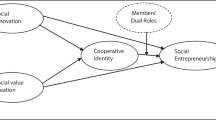Abstract
There has been a revival of interest in cooperative enterprises as an alternative to capitalist enterprises. After visiting the Mondragon Corporation, the largest workers’ cooperative in the world, established in the Basque region of Spain in 1956, the Marxian scholar Richard Wolff wrote an op-ed piece in The Guardian where he argues that cooperatives like the Mondragon Corporation must be seen as a central element of a socialist alternative to capitalism. While the conventional understanding of Marx’s own writing on cooperative enterprises suggests that such a form as a cooperative enterprise cannot escape the teleological thinking which subsumes it under the forces of monopoly capital, the actually existing cooperatives around the world have occasionally received a positive reaction from the Marxian scholars. This paper is an attempt to situate cooperative enterprises in the extant literature on production organization within the Marxian tradition, keeping in view the ambiguities and contestations about the place of cooperatives within the Marxian scheme of things. We argue that a perspective founded on the class processes, which entails the production, appropriation, and distribution of surplus value, could help us understand the nature of a cooperative enterprise vis-à-vis capitalist enterprises. In this perspective, the conventional ways of judging ‘successes’ and ‘failures’ give way to an understanding based on the fundamental and subsumed class processes. Drawing on the works of Resnick and Wolff and using primarily the data collected through a survey of the handloom weavers’ cooperatives in West Bengal, and a few other cases from the literature as well, this paper aims at broadening our understanding of the potential of cooperatives for providing a viable alternative to capitalist production organization.
Access this chapter
Tax calculation will be finalised at checkout
Purchases are for personal use only
Similar content being viewed by others
References
Arora, Tarun. 2010. Comparing Weavers’ Institutions in Handloom Industry. M.Phil thesis, University of Hyderabad.
Banerjee Abhijit, Dilip Mookherjee, Kaivan Munshi, and Debraj Ray. 2001. Inequality, control rights, and rent seeking: Sugar cooperatives in Maharashtra. Journal of Political Economy 109 (1): 138–190.
Basu, Deepankar, and Amit Basole. 2011. Relations of Production and Modes of Surplus Extraction in India: Part II—‘Informal’ Industry’, Economic and Political Weekly, XLVI (15): 63–79.
Baviskar, B.S. 1969. Cooperatives and Caste in Maharashtra: A Case Study. Sociological Bulletin, September.
Bhowmik, Sharit Kumar. 1988. Ideology and the Cooperative Movement. Economic and Political Weekly, December 17.
Bowles, Samuel, and Herbert Gintis. 1993. A Political and Economic Case for the Democratic Enterprise. Economics and Philosophy 9 (1): 75–100.
Bradley, Keith, and Alan Gelb. 1983. Cooperation at Work: The Mondragon Experience. London: Heinemann Educational Books.
Chakrabarti, Anjan, and Anup Dhar, and S. Cullenburg. 2012. World of the Third and Global Capitalism. Worldview Publications.
Chakrabarti, Anjan, and Anup Dhar. 2008. Labor, Class and Economy: Rethinking Trade Union Struggle. Economic and Political Weekly. May 31.
Communist Party of India (Marxist). Election Manifestoes for 1999, 2004, 2009, 2014 General Elections.
Craig Ben, and John Pencavel. 1992. The Behavior of Worker Cooperatives: The Plywood Companies of the Pacific Northwest. American Economic Review 82 (5): 1083–1105, December.
Das, Sujit Kumar. 2001. The Warp and Woof. Kolkata: K.P. Bagchi & Company.
DeMartino G. 2003. Realizing Class Justice. Rethinking Marxism 15 (1).
Dinerstein, Ana Cecilia. 2015. The Politics of Autonomy in Latin America: The Art of Organizing Hope. UK: Palgrave Macmillan.
Doucouliagos, Chris. 1990. Why Capitalist Firm Outnumber Labour-Managed Firms. Review of Radical Political Economy 22 (4): 44–67.
Doucouliagos, Chris. 1995. Worker Participation and Productivity in Labour-Managed Firms and Participatory Capitalist Firms: A Meta-Analysis. Industrial and Labour Relations Review 49 (1): 58–77.
Dow, Gregory K. 2003. Governing the Firm: Workers’ Control in Theory and Practice. Cambridge: Cambridge University Press.
Elster, J. 1989. Social Norms and Economic Theory. Journal of Economic Perspectives 4: 99–117.
Furubotn, Eirik G., and Svetozar Pejovich. 1970. Property rights and the behavior of the firm in a socialist state: The example of Yugoslavia. Zeitschrift für Nationalökonomie 30(3–4): 431–454.
Gibson-Graham, J.K. 2006. End of Capitalism (As We Knew It): A Feminist Critique of Political Economy. University of Minnesota Press.
Isaac, T.M. Thomas, and Michelle Williams. 2017. Building Alternatives: The Story of India’s Oldest Construction Workers’ Cooperative. Leftword Books.
Jossa, Bruno. 2005. Marx, Marxism and Cooperative Movement. Cambridge Journal of Economics 29: 3–18.
Lebowitz, M. 2016. What is Socialism for the Twenty First Century? Monthly Review. October 2016.
Lenin, V.I. 1923. On Cooperation. https://www.marxists.org/archive/lenin/works/1923/jan/06.htm (accessed on September 25, 2016).
Marx, Karl 1864. Inaugural Address of the Working Men’s Association. The First International. https://www.marxists.org/archive/marx/works/1864/10/27.htm (accessed on September 25, 2016).
Marx, Karl. 1867 [1977]. Capital: A Critique of Political Economy, vol. 1, New York: Vintage Books, A Division of Random House.
Marx, Karl. 1871. Civil War in France. https://www.marxists.org/archive/marx/works/download/Marx_The_Civil_War_in_France.pdf.
Marx, Karl. 1894. Capital, vol. 3. London: Penguine Classic Edition.
Mukund, Kanakalatha, and B. Shyamsundari. 1998. Doomed to Fail? ‘Handloom Weavers’ Co-operatives in Andhra Pradesh. Economic and Political Weekly 33 (52): 3323–3332.
Resnick, S., and R. Wolff. 1987. Knowledge and Class: A Marxian Critique of Political Economy. University of Chicago Press.
Ruccio, David F. 2011. Cooperative, Surplus and Social. Rethinking Marxism 23 (3): 334–340.
Sen, Ratna. 1996. Workers’ Management: Some Industrial Cooperative Experiences. Calcutta: Subarnarekha.
Wolff, Richard. 2012. Democracy at Work: A Cure for Capitalism. Chicago: Haymarket Books.
Author information
Authors and Affiliations
Corresponding author
Editor information
Editors and Affiliations
Rights and permissions
Copyright information
© 2019 Springer Nature Singapore Pte Ltd.
About this chapter
Cite this chapter
Bhowmik, M.R., Chakraborty, A. (2019). Class Processes and Cooperatives. In: Chakraborty, A., Chakrabarti, A., Dasgupta, B., Sen, S. (eds) ‘Capital’ in the East. Springer, Singapore. https://doi.org/10.1007/978-981-32-9468-4_13
Download citation
DOI: https://doi.org/10.1007/978-981-32-9468-4_13
Published:
Publisher Name: Springer, Singapore
Print ISBN: 978-981-32-9467-7
Online ISBN: 978-981-32-9468-4
eBook Packages: Economics and FinanceEconomics and Finance (R0)




